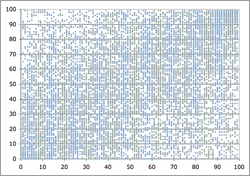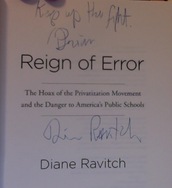Those with narrow focuses often say that seniority is one of the biggest parts of the teacher's contract to be changed. After all - when looking at today's fiscal crisis, isn't it unfair that high-quality teachers with fewer years of experience are being let go when the older, more prone to sit-around-and-wait-for-a-paycheck teachers get to keep their jobs? This is an unfortunate dichotomy that has been set up as the grounds for any conversation of the issue. In reality, there are more people in between than can be properly counted.
Inherently related to this problem is that of teacher evaluation. If the idea that those hired more recently would be let go in a fiscal crisis (the so-called last in - first out rule) were to disappear, one would have to base hirings and firings on something. Enter: value-added modeling, a system in which teachers are rated on how much they raise their student's scores compared to similar student populations. Many proponents of ditching seniority (Philadelphia School Partnership and PennCAN to name two) point out that a system based on data is a better idea that one based on seniority in order to retain the high-quality teachers needed in the classroom. One need only read pieces by Gary Rubinstein (a public school teacher in NYC) to understand its faults.

Seniority is also about more than just hiring and firing. In Philadelphia right now teachers are being shuffled around due to a process called "leveling" where the number of students who were supposed to show up at school is balanced with those who actually do. That shuffling is usually based on seniority - up until now. Now, "other factors" are being considered. What's interesting here is that I might agree with some of those factors. When teachers are moved or bumped from students they have great relationships with, I have serious issues. But, if it is a question about a more senior teacher being moved vs. a less senior teacher with similar populations, I would probably err to the side of the less senior teacher being moved.
It is obviously very complicated but one thing is fore sure: these policies are making the teacher profession seem more like a "job" than many want it to be. It's possible that the revolving door of the newbie educators could become a regular thing, jeopardizing our students due to lack of experience. I can only hope that any new policies presented involved actual teacher dialog to ensure buy-in and knowledge that we have to offer.





 RSS Feed
RSS Feed
